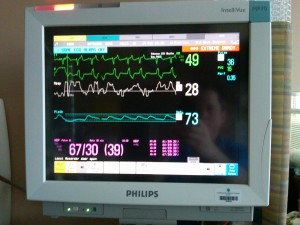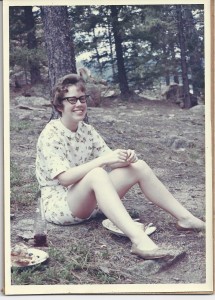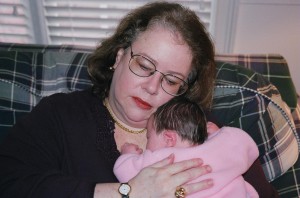February 15, 2012. One year later. The date reads the same, except for a difference of only one number; but, what a difference that one number can make. If that two were a one, I would be back there, on that day; but, instead I am here, where everything has changed.
Death is totally in the numbers. The time on the clock was 12:29 p.m. Her blood pressure stats were changing on the monitor, from hour to hour, 99/63 … 67/30….The phone number from the nursing home the day she got sick lingering on my caller ID. 704.… And of course, the exact date on the calendar when she died. 02/15/2011….

There are the numbers of the days that slip into a count of the weeks, which amount to the passing of months – starting at a crawl but before you know it, fly by at a run. And pretty soon you arrive at a year. Before too long, not having a mother anymore is no longer your first thought upon waking. It becomes, perhaps, your second or third thought, until it hits you mid-morning or even mid-afternoon. Then, on some months, the 15th slides right on by and you realize later; oh my, it was ten months ago yesterday, wasn’t it?
As the countdown clock of 2011 wound down, I began to feel a strange melancholy ache about leaving this dark year behind; because, as much as I was ready to begin anew, it felt as though that switch in year meant I had to permanently leave my mother behind.
For my daily consciousness to no longer be in the context of my mother died this year, but to have to now be my mother died last year; or, knowing one day, sooner than I think, it will be three years ago … five years ago … ten years ago … infinity years ago….
In my mind’s eye, all this passing time seemed to make losing my mother matter less; because, I knew the world at large would see it as less of a loss, once a certain amount of time had gone by. So many people might think, she died last year; well, really then, shouldn’t you be over that by now, shouldn’t you not feel the fresh raw grip of gut-wrenching sadness that you will never talk to your mother again, now that a full year has passed?
Because you see, death is also in the people you leave behind. The ones who show up and the ones who don’t. In addition to everything else you have to process, you have to process the little discussed truth that, with one singular death, there are going to be what is termed in the psychological textbook for grief, “secondary losses.” Or, in other words, the heartbreakers. These take the shape of the people who can’t turn and face with you the depth of your pain and the monumentality of life change that has just happened to you. The people you loved and trusted and thought you knew, before death. But then, after death, become someone you didn’t really know at all.
Life becomes that simple. Your life before death. Your life after death.
But there are always the ones who do show up, and show up in ways that will make your heart hurt with their love and support.
On Monday, February 14th, 2011– Valentine’s Day no less – I sat alone in an ICU room after having made the decision to have my mother taken off life support; knowing that, as impossible as it was for my head to understand, the next several hours of my life would be spent waiting for my own mother to die.
And then my friends came. Like a flock of support. They arranged childcare, got their husbands home from work and dropped whatever they were doing to be at my side, so I did not have to sit alone in a room, watching a monitor.
My own husband instantly stepped up and assured me that our children would be fine, that he would do whatever was necessary – including the last minute errands for Abby’s preschool Valentine’s Day party the next day – and made me feel filled with his love.
And my sister, the only other person who was about to endure exactly what I was, got on a plane and flew for hours – and made it in time to be together at our mother’s side. It was fitting, really, because sisters are like that, you know – at least the good ones anyway. They are just there, always. And in the end, through the final hours, minutes and seconds – while my mother’s heart ebbed – it was the two of us, alone, in the dark ICU room, in the pitch of night, making more than one off-color joke. And then, still, just the two of us after the sun came up the following day and we stood for the final time with our mother, holding her arm oh-so gently, as she passed away.
In the days following her death, I was blown away, and still am, by the outpouring of support and love I received from people, near and far. I cannot tell you how amazing it was to receive emails and cards and calls from people with memories and offers of help or just kind, genuine condolences.
My mother’s brothers, my beloved uncles who I adore, flew across the country and assisted me and my sister in cleaning out her room at the nursing home and her closet at my father’s home. And as they have done for my entire life, made us laugh and just feel better, for even tiny moments. My mom’s very best friend in the whole world, my second mother, called daily and we felt her love stretch across the miles.
There are the people who think to ask every few months, randomly, about how I am feeling and there are those who remember on the big firsts, like Mother’s Day, to say, “I know this must be hard for you.” And because I am human, and we humans like to focus on what we don’t have rather than on what we do, I forget sometimes to think more about those people than the ones who don’t make those calls to me, who don’t ask those seemingly simple questions. But I have learned that family is not only made by blood, but by those who surround you in times of triumph and trial.
*****************************************************************************
Death is in the moments. The order of Chinese food just days after her passing that somehow contained lo mein, even though no one had ordered it. Except, that my mother ordered lo mein every time she ate Chinese food.
Or in discussing how to pick the right place to scatter her ashes, when me, my sister and my uncles almost simultaneously began talking about a small picture that used to hang in my grandmother’s house; one where my mom looked so young, happy and peaceful. A picture none of us had ever discussed with anyone else before, yet we all managed to bring up at that exact moment.
Life contains very few decisions that feel perfectly right, but deciding to scatter her ashes in the park where that picture was taken was one of them.

Or in the moment, a few months later, when we learned that the park was closed for the summer – but my uncle getting special permission for us anyway – then realized that is how she would have preferred it … private, with no strangers. We could practically hear her saying it.
Then, the moment of realization that the bag of trash you so haphazardly threw away in a trash can at a hamburger stand on the side of a mountain road actually contained her extra ashes; and the realization that no one would have loved that story more than your mother.
Or, that night at dinner, on my mother’s first birthday … without her, when her very best friend in all the world – in her very best blond moment – punchily, quasi-ordered a dessert on behalf of the dearly departed birthday guest with a request for the wait staff to sing Happy Birthday. And then, the staff showed up at the end of the meal with a piece of cake and a song ready. We all laughed until we cried at how we had been joking when we suggested it. But again, no one would have loved that story more than my mom.
And then, all the moments in between, the day to day, you watch life somehow go on. The checkbook still needs to be balanced; the kids still need to get bathed or be driven to school, and the grocery store still needs to be visited. But then, sometimes, out of the blue, out of the waves they call grief, a giant fist appears out of nowhere and delivers a knock-out punch to your soul; and it cries out, “Your mother is dead.”

It can be as simple as a song on your iPod that reminds you of the time when she – who would immediately turn off the radio when she got in a car – tried to argue that she loved music more than the average person. Or the first time that you see Tom Hanks on David Letterman and your hand reaches for the phone to tell her, because he was her biggest Hollywood crush.
Then there are the profound moments like when your daughter looks at you with tears brimming over the edges of her big blue eyes and says, “No else loved me or listened to me like she did.” And you know that she is right.

So here I am. It has been a year. I don’t feel like I have crossed a finish line or won any kind of trophy, and I certainly don’t feel like I have achieved any sort of closure. I definitely don’t feel as though time has healed anything, because all that I feel time has done, for me, is pass by.
I still carry my grief with me. It is a part of me now. My grief is made of irreparable loss, of pain, of memories of red flashing phone numbers, the surprising grittiness of ashes, a hamburger stand on the side of the road.
If I learned anything, it is that no one can be prepared for a major death, and time can’t fix everything. All time does is allow you to find a way to accommodate grief, like a sudden and permanent limp that doesn’t stop you completely but will forever alter the way you move through the world.





